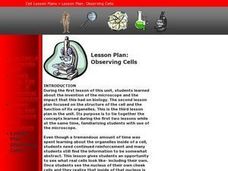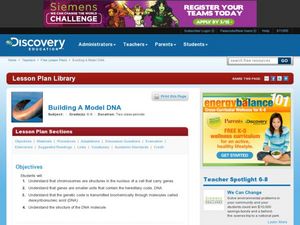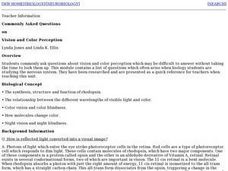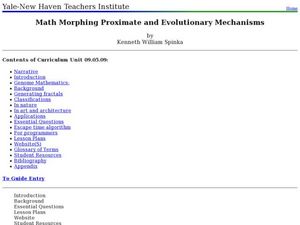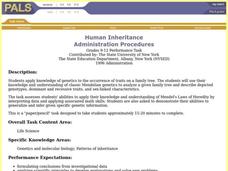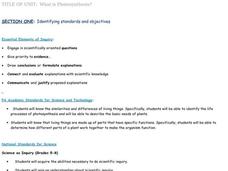Curated OER
Zebrafish Development
Middle schoolers examine the early development of zebrafish as a model for embryo development in humans. They observe various stages of zebrafish reproduction from sperm and eggs to fertilized eggs and hatchlings.
Cornell University
Shedding a "Little" Light on Cancer Surgery
Many types of cancer treatments now depend on nanotechnology—a big "little" discovery. Scholars begin by removing "malignant" tissue from simulated brains, one using fluorescent markers thanks to nanotechnology and one without. This...
Curated OER
Mechanisms to Fight Disease
Students explain how our body fight diseases. In this biology lesson plan, students identify the role of bacteria and viruses in human illness. They create a PowerPoint presentation and essay at the of the unit.
Curated OER
Building a Model DNA
Students explain the function of DNA in the body. In this biology lesson, students build a DNA model using simple materials. They demonstrate how bases pair up in the helix.
Curated OER
Poriferans and Cnidarians
Students study the major phyla of the animal kingdom. In this biology instructional activity unit, students identify their general characteristics. They define taxonomy terminologies.
Curated OER
Nucleic Acids and Protein Synthesis
Tenth graders complete a vocabulary assignment based on terms in the unit. They complete appropriate worksheets as each section of the unit is completed. They participate in classroom discussions. They construct a model of a DNA molecule.
Curated OER
Commonly Asked Questions on Vision and Color Perception
Learners commonly ask question about vision and color perception which may be difficult to answer without taking. They use this module that contains a list of questions which often arise when biology students are studying the nervous...
Curated OER
Math Morphing Proximate and Evolutionary Mechanisms
Students identify the different types of fractals. In this geometry lesson, students use math to analyze different biological phenomena. They collect data from the experiments and construct graphs.
Curated OER
The Teaching of Biology and Difference
Seventh graders pretend they were Anton looking through the microscope for the first time. They describe the way he felt when he observed tiny moving objects in the sample of pond water. They look at their own samples of pond water,...
NOAA
Individual Species in the Deep Sea
A tube worm's outer covering is made of chitin, the same material that makes up the shells of lobsters and crabs. Scholars create tube worms and analyze and discuss the longevity of organisms living near cold seeps. They then discuss and...
Curated OER
Live Well Now to Live Longer Later
Ninth graders select a topic to research, completing the sentence, "Are the effects of _______ really that detrimental to one's health?" They record information in a journal, including sources of information. Students work in groups with...
Curated OER
Human Inheritance
Students analyze genetic characteristics in a given family tree through the F2 generation. Students apply prior knowledge from Gregor Mendel's study with pea plants and his Laws of Heredity to answer questions.
Curated OER
USING YEAST AS AN ULTRAVIOLET LIGHT MEASUREMENT TOOL
Pupils realize the importance of organisms as standards of measurement and experimentation.The first lab is a simple survival curve that demonstrates the effects of UV light on cells. The second lab looks at repair mechanisms of the DNA...
Curated OER
Gene Regulation Mechanisms
Young scholars explore genetics. They discuss how chromosomes and/or genes are regulated during the life of an organism. In a lab setting, students compare and contrast the genomic regulation of prokaryotic and eukaryotic cells using...
Curated OER
Internet Lesson Plan: Mitosis and Meiosis
Students learn the processes of cell division, both somatic and sexual through lecture. They participate in an Internet instructional activity to strenghten their understanding of mitosis and meiosis.
Curated OER
What is a Living Thing, and How Does a Living Thing Respond to Its Environment?
Students investigate how living things interact with their environment. In this living things lesson, students complete lessons for science investigations on what living things have in common. Students study cells, complete...
Curated OER
Drosophila Melanogaster
Students cross wild type flies and mutants, both purchased from a biological supply house (Carolina Biological Supply or Wards, for example) in groups from lesson one.
Curated OER
Transcription, Translation, and the Genetics of Microbes
Students construct various virus models using Fruit loops and Alphabits to represent nucleotides and molecules. They constructs capsomeres using shoes as the capsomeres and discuss various viruses.
Curated OER
REPRODUCTION
Students complete a variety of activities to study different concepts in Science. The activities are part of a layered curriculum. This is used to differentiate instruction and give a wide variety of assessment opportunities.
Curated OER
What is Photosynthesis?
Students investigate the similarities and differences of living things. Specifically, students will be able to identify the life processes of photosynthesis and describe the basic needs of plants.
Curated OER
SEXUAL LIFE CYCLE DEVELOPMENT USING MONOCYSTIS
High schoolers perform a lab to becoe familar with scientific concepts. The skill of inquiry is essential and this lesson furthers its development. The intelligence of kinesthetics is used as learners perform the many aspects of this lab...
Curated OER
Respiration
Students study the gas exchanges that occur during cellular respiration. They observe what happens as a result of a number of variables on the rate of respiration. They use microrespirometers to measure the oxygen consumption of...
Curated OER
Hazard Mitigation: Bioterrorism
Students discuss different ways to spread infectious diseases. In this bioterrorism lesson, students model the rate of smoke emission using CalRoad software. They analyze the effects of airborne release of biological...


